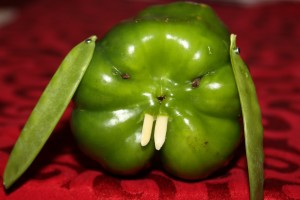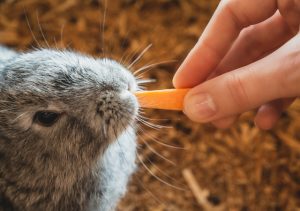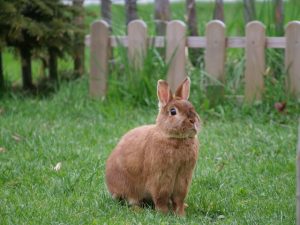
Green peppers are highly nutritious. This bell shaped vegetable is known to have a tangy taste that enhances food flavor. They also add a dash of color to any dish.
Green peppers are abundant in vitamin C, potassium and manganese. They likewise contain the healthy omega-3 and omega-6 fatty acids that help prevent cardiovascular disease. Green peppers are also low in fat and calories and have dietary fibers which promote regular bowel movement. Aside from being loaded with essential vitamins and minerals, green peppers are low on the glycemic index. That means it is safe for diabetics as well.
With all these nutrients, green peppers can be a regular element of a healthy eating plan.
Can I Give My Rabbit Green Peppers? Yes, but add variety of vegetables as well
Yes, you can feed your rabbit fresh green peppers. Just ensure that you are feeding your pet a varied selection of fresh vegetables. Although green peppers are generally healthy, too much of a good thing could still cause diarrhea. A healthful rabbit diet would include a combination of vegetables along with pellets and grass hay.
When introducing new fresh foods to your rabbit’s diet it is recommended to go slowly. Give him green peppers in small amounts first. This will allow his gastrointestinal tract to adjust. If ever you notice symptoms of diarrhea or digestive upset, stop giving your bunny green peppers. You can simply continue to feed him with other kinds of vegetables.
It is best if you can regularly feed your rabbit any variety of grass hay, as such is rich in vitamins A and D as well as in calcium, protein and other essential nutrients. Consuming hay promotes healthy gastrointestinal tract and teeth. Varying the type of grass hay is a good idea. You can give him timothy, orchard, brome, etc. However, you should not give him too much alfalfa hay as it is way too high in calories and protein. In fact, afalfa is not even a grass but rather a legume.
While rabbits are always seen on cartoons to be crunching down on carrot sticks, it's important not to feed them with too much carrot. Carrots contain vitamin A. Although it is an essential vitamin, too much of it can also cause problems.
Studies have shown that like in humans, your rabbit’s diet must be diverse too. However, always consider that the amount of fiber on your pet’s diet should be really high. The more fiber that your bunny consumes, the better it is for his overall health.
Fiber offers many benefits to your bunny. It will help keep his digestive system from blocking up. This is a common problem among rabbits. If your pet fails to consume adequate amount of fiber, he will have a higher risk of developing digestive illnesses.
Your rabbit's diet also needs to have a small amount of protein. He can get this from eating pellets specifically formulated for bunnies.
When choosing rabbit foods, you should always consider the components. Check the label and see if it mimics a rabbit's diet in the wild. Good quality pellets must contain high fiber – should be more than 20 percent. It needs to be less than 15 percent in terms of protein. Most pellets are made from oats, alfalfa, and timothy oats. The best kinds of pellets are those made of natural ingredients with timothy oats.
Also keep in mind the age of your pet when choosing pellets. Baby rabbits will need more commercial pellets than adults for they need more energy to grow. Your baby rabbit could heavily rely on pellets to survive. However, once they reach adulthood, pellets should be greatly reduced and be replaced with more grass hay and fresh vegetables. Adult rabbits that only eat pellets are most likely to be obese, thus their health is compromised.
Fresh foods are critical to good nutrition. Your pet’s diet should always contain fresh foods as they provide moisture in the diet, which is good for your bunny’s kidney and bladder function. The majority of fresh foods should be composed of leafy greens. However, do not feed your rabbit the same greens all the time. Eating the same food day after day can be dull. So mix it up. Rotating the greens is not only good for general nutrition but also gives your pet variety in texture and taste.
To have a happy and healthy bunny it is imperative to meet his daily dietary needs. Remember that variety is the key.





